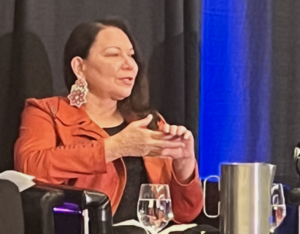Madahbee Leach contributes details on reconciliation action plans at Toronto conference

By Sam Laskaris
TORONTO – Besides serving as the general manager of the Waubetek Business Development Corporation since 1988, Dawn Madahbee Leach is also a member of numerous prestigious Indigenous boards and committees.
Madahbee Leach, a member of Aundeck Omni Kaning First Nation on Manitoulin Island, is also a frequent speaker at numerous conferences.
For example, she was a panellist at the Prospectors & Developers Association of Canada (PDAC) conference, held earlier this month in Toronto.
The four-day event, which concluded Mar. 5, included various Indigenous programming sessions.
Madahbee Leach spoke on reflecting on reconciliation action plans in mining and exploration.
During the talk, she was asked why it’s important to create a reconciliation action plan and how a reconciliation action plan can integrate into other national strategies.
“When you do a reconciliation action plan, it really strongly demonstrates that your company or your organization is enlightened, open, inclusive,” Madahbee Leach said. “And what company or organization doesn’t want to be seen that way?”
As a member of several Indigenous advisory committees, she has been helping with many reconciliation action plans.
“I think as you develop these, it’s also important to realize that you have to do this in a meaningful way with the Indigenous people, especially the ones in the area in which you’re operating,” she said. “It’s important to find out who to work with there and to see if there’s anybody who can assist you because they know what the local landscape is about, what the local issues are about. They can help you to develop a really good reconciliation action plan.”
Madahbee Leach also said those with decent reconciliation action plans will have doors open for them to provide projects to move forward at a quicker pace, in all likelihood because they’ve already incorporated aspirations and needs of Indigenous communities.
She added reconciliation action plans have to be ongoing.
“It’s also something that you continue working on with the community,” she said. “So, it’s got to be meaningful. It can’t be just published once and that’s it.”
Madahbee Leach also said reconciliation can impact a company’s bottom line in a positive way.
“So, reconciliation isn’t just a thing to do or a trend,” she said. “It’s something that when you engage communities, you’ll see these companies do well.”
Besides learning about truth and reconciliation, there are other tools available that can help.
For example, Madahbee Leach mentioned a document released in 2022 called, National Indigenous Economic Strategy for Canada.
“It provides you with guidance and advice, like for governments, for health organizations, for justice systems, [and] what you can do on the path of economic reconciliation,” she said.
Madahbee Leach also mentioned the Saskatchewan-based First Nations University of Canada.
“They have a program for boards of directors on reconciliation,” she said, adding it is titled Reconciliation on Bay Street. “It’s talking to corporate Canada and how you can become involved in reconciliation. So, it’s an online course that I recommend all board members to take of all companies. I recommend that senior managers take that course. Everyone who’s interested in reconciliation should take that course. And it’s only a few hours.”
Madahbee Leach concluded her portion of the talk by stating mistakes have been made in the country.
“But we’re trying to reconcile the past and the fact that Indigenous people weren’t included and we weren’t included for many reasons,” she said. “But the main reason was because of our land. There was interest in using the lands and resources. And so, this is really something that we’re trying to reconcile. We’re trying to become involved in this. That’s what our aspirations are now – to become involved, and having a say in what’s going on in our traditional territories and waterways.”
About 27,000 delegates from more than 135 countries attended this year’s PDAC conference.
The event, which has been held annually in Toronto since 1932, is considered the world’s premier mineral exploration and mining convention.


